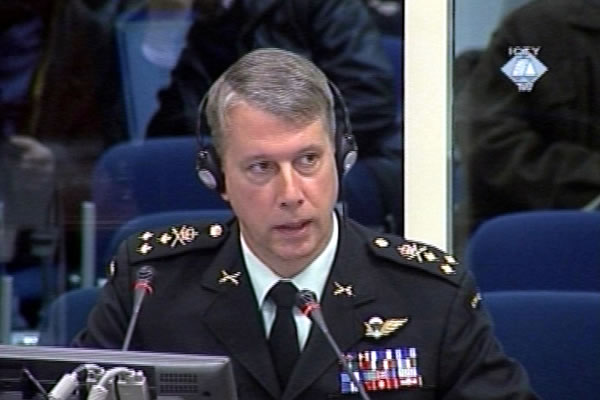Home
‘INDISCRIMINATE AND DELIBERATE’ SHELLING OF KNIN
General Andrew Leslie, former chief of staff of UNCRO in Sector South, began his evidence today. General Leslie is now the commander of the Canadian ground forces. He is testifying at the trial of Croatian generals Ante Gotovina, Ivan Cermak and Mladen Markac about the first days of Operation Storm
 Andrew Leslie, witness in the Gotovina trial
Andrew Leslie, witness in the Gotovina trial General Andrew Leslie, commander of Canadian ground forces, started his evidence today at the trial of Croatian generals charged with crimes committed in Operation Storm and its aftermath in the summer of 1995. When the operation was launched, the then colonel Leslie was in Knin as the chief of staff of UNCRO in Sector South.
In early August 1995, Knin was an undefended town, the Canadian general said. The town had not prepared for the defense and there were few troops in the town itself. All the Krajina Serb forces were moved to the demarcation line where the attack was expected to happen.
The attack started on 4 August 1995 at 5am with an intense artillery barrage. General Leslie, who spent most of his long military career in the artillery, described the first attack as ‘random, synchronized and continuous’, aimed at the whole town. Two hours later, the shelling abated a bit and the attack concentrated on particular parts of the town. Among them were the town center and the targets General Leslie described as military: the train yard, the factory complex and the anti-aircraft battery of the Krajina Serb army. The shelling lasted until nightfall. The next morning it recommenced, following the same pattern. It lasted until the Croatian forces entered Knin, at approximately 11 a.m. on 5 August 1995.
In the afternoon of 4 August, Canadian general Forand, commander of the UN Sector South, sent a protest letter to General Gotovina, who commanded the Croatian Army forces in that sector, because the attack targeted innocent civilians and UN facilities. He demanded an immediate ceasefire and the withdrawal of Croatian army from the zone of separation. Gotovina’s defense objected to the admission of the letter, saying there was no evidence that the accused general received that letter. The Trial Chamber nevertheless admitted this document into evidence. According to the witness, a few days later Captain Marin Lukovic, General Gotovina’s liaison officer with the UN, confirmed that he was aware of the contents and importance of the letter.
In the morning of the 5 August, General Leslie was asked by a Serb doctor to evacuate some thirty patients from the Knin hospital, many of whom were in a critical condition. Leslie went there with six armored personnel carriers. In his words, he saw a ‘great number of dead bodies’ in the hospital, lined up along the corridors and in a make-shift morgue. When the judge asked him to be more precise, Leslie said there had been ‘more than 30 and less than 50 or 60’ bodies.
Soon after the convoy returned from the hospital, the Croatian army and its tanks arrived in front of the UN base to block the entrance and prevent the UN personnel from going into town to see what was going on there. According to Leslie, the blockade lasted until 9 August and he was among the first who left the base. On that day, he went to Zagreb to assume his new duty, the UNCRO chief of staff. In Zagreb, Leslie drafted a report in which he described the shelling of Knin as ‘indiscriminate and deliberate’. Despite the objections of General Gotovina’s defense, this report was also admitted into evidence.
As today’s hearing drew to its close, the cross-examination of General Leslie began. It will continue over the next two days.
Linked Reports
- Case : Gotovina et al. - "Operation Storm"
- 2008-04-17 DEAD BODIES WERE RUN OVER BY TANKS
- 2008-04-16 AUTHORITIES COULD HAVE PREVENTED ARSON AND LOOTING
- 2008-04-15 WHO SHELLED KNIN?
- 2008-04-23 GENERAL LESLIE UNDER FIRE FROM GENERAL GOTOVINA’S DEFENSE
- 2008-04-24 CROATIAN ARTILLERY WAS ‘BAFFLING’
- 2008-04-25 CIGARETTE CASE HELPS WITNESS RECOGNIZE HIS FATHER
